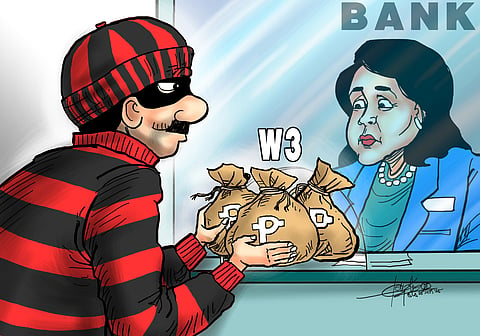
- NEWS
- the EDIT
- COMMENTARY
- BUSINESS
- LIFE
- SHOW
- ACTION
- GLOBAL GOALS
- SNAPS
- DYARYO TIRADA
- MORE

The Anti-Money Laundering Council must act with haste to prevent money from being spirited out of the country or moved to safe hiding places after the players in the flood control racket were exposed.
Several individuals, including Senators Chiz Escudero, Joel Villanueva, and Jinggoy Estrada, former senator Bong Revilla, and Ako Bicol Partylist Rep. Zaldy Co, will face charges of graft, indirect bribery, and malversation.
As with the past P10-billion pork barrel scam, the perpetrators are moving funds to place them out of the government’s reach.
The question thus is the involvement of banks, primarily government financial institutions, in facilitating huge fund transactions.
The Bangko Sentral ng Pilipinas (BSP) has frozen over 700 accounts linked to the anomalous flood control projects, but vast sums of money are still being transferred in and out of the country.
BSP Governor Eli Remolona said that to control the flow of money, a circular was issued on 18 September restricting daily cash transactions to P500,000.
The circular requires transactions above P500,000 or its equivalent in foreign currency to be conducted through traceable channels such as checks, online fund transfers, direct credit to deposit accounts, or digital payments.
The same limit applies to cash transactions in equivalent foreign currencies.
The limit may be reached in a single transaction or series of transactions within one banking day.
“Through this reform, the BSP aims to strengthen measures against the use of cash for illegal activities, promote trust in the financial system, and ensure that it can respond to new risks,” the central bank said.
The limit, however, is expected to have a backlash on legitimate cash-based businesses which Remolona admitted will be affected.
The BSP move angered the public, calling it a hassle, especially for businesses and individuals with legitimate needs amounting to more than P500,000 per day. The bank, according to the BSP chief, will still allow huge cash volumes if these are justified.
“A businessman can come to a bank and say I need more than P500,000 in cash and this is why I need the cash and the bank will understand that,” he said.
The BSP is also talking to banks regarding their possible complicity with the huge cash flows.
“The BSP is trying to analyze not just cash but any financial transaction that looks unusual,” according to Remolona.
He said most of the suspect cash transfers are coming from government financial institutions.
“That makes sense because it’s government money so it would go through government financial institutions,” the country’s top banker said.
He guaranteed that there is no danger of a bank run as banks are very liquid at this point.
“I think I can say that with confidence — no bank runs,” Remolona said.
A foolproof response would be to adopt digitalization, suggested former Finance secretary Cesar Purisima.
“Bribes, kickbacks and under-the-table deals thrive in cash precisely because it is untraceable, untaxed and invisible to regulators. As long as cash remains king in illicit transactions, corruption will always find a way,” Purisima said in a social media post.Limiting cash withdrawals is a move in the right direction, following the European Union’s example, where cash payments are capped at 10,000 euros. This means that large transactions in the banking system will leave an audit trail.
Large cash withdrawals should be automatically reported, Purisima said, because while “the Anti-Money Laundering Act already requires suspicious transaction reporting, cash withdrawals remain a blind spot.”
He also proposed regular demonetization, “say every seven to 10 years… [to] prevent illicit cash from sitting safely in vaults indefinitely.”
The government must, as its next step after prosecuting the crooks, bring together its best minds to prevent the perversion of public funds from ever happening again.
